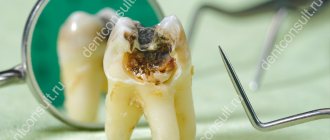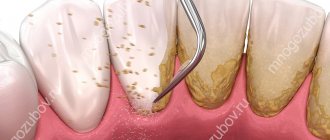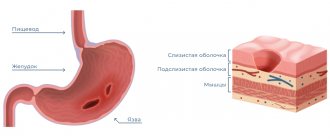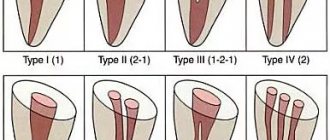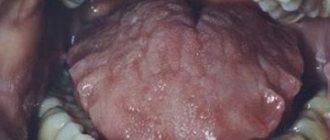Vitamin A
Vitamin A or retinol enhances the protective properties of the skin and mucous membranes. With its deficiency, yellow pigmentation and hypoplasia of the hard tissues of the teeth may appear on the teeth, if this deficiency in the vitamin is revealed during the period of their development. If a deficiency of vitamin A occurs after teething, a disease such as hyperkeratosis and proliferation of the base layer occurs.
With an excess of vitamin A, an anomaly in the development of the jaws and tongue occurs, as well as an anomaly in dentin density.
What happens if you don’t pay attention to bleeding gums?
If you notice bleeding gums and do not have other symptoms that cause discomfort, you should not ignore this manifestation. Inflammation of the gums and open wounds can allow infection, which will not only lead to the appearance of periodontal disease, but can also disrupt the functioning of internal organs.
My gums are bleeding, what should I do? 10 tips on how to cure
If the cause of gum inflammation is clarified and there is little bleeding, home treatment can be used. However, a preventive examination by a dentist is still necessary! A positive effect can be achieved by choosing complex treatment. 1. Visit the dentist - this is a mandatory recommendation. He will prescribe simple preventive measures.
2. Use toothpastes recommended by your dentist. 3. Pay attention to your oral hygiene. 4. Normalize your diet. Your diet should be rich in vitamins and minerals. You can take a complex of vitamins. 5. Prevention using alternative medicine, using only gentle methods. 6. Treatment of gum inflammation with pharmaceutical medications is allowed. 7. Use anti-inflammatory gels. 8. Pharmacy and non-traditional products are suitable as a rinse. Definitely gentle. 9. Avoid smoking. This erodes your gums and tooth enamel. 10. Do not eat seeds, nuts, crackers, hard cookies and other hard foods that can injure your gums when chewed. Use alternative methods of consuming them. For example, it is better to cut the apple, chop the nuts, eat only soft bread. It is recommended to take the issue of treating bleeding gums seriously. Contact your dentist for advice. He will examine your oral cavity and prescribe preventative treatment that is right for you.
Vitamin D
Vitamin D - regulates the metabolism of calcium and phosphorus in the body, stimulates the growth and formation of bones, and participates in the formation of tissue respiration. With a lack of vitamin D, the well-known rickets develops, as well as dental caries. In addition, a lack of vitamin D leads to a primary state of calcium metabolism. There is an increase in the volume of the organic dentin matrix. Osteoporosis of the bone tissue of the alveolar process may develop, and in severe cases, enamel hypoplasia occurs. With a lack of vitamin D, as well as calcium and phosphorus, rickets occurs in children, and osteomalacia (mineralization disorder) develops in adults.
With insufficient amounts of vitamin D and normal levels of calcium and phosphorus, osteoporosis and resorption of dental cement develop.
With a lack of vitamin D and calcium, but with a normal amount of phosphorus, resorption of the jaws and hemorrhages into the bone marrow spaces may occur.
With a lack of vitamin D along with phosphorus, with a sufficient amount of calcium, rickets occurs.
With a lack of calcium and phosphorus and with normal vitamin D levels, alveolar bone resorption occurs.
With a lack of phosphorus and with normal levels of vitamin D and calcium, there is slow growth of the jaws, delayed teething, which subsequently leads to bite pathologies.
Hypervitaminosis D also leads to negative consequences. First, osteosclerosis occurs, then osteoporosis and resorption of the alveolar process. In addition, intensive formation of tartar occurs, hypercementosis and ankylosis occur. It should be noted that death can occur when large doses of vitamin D are administered.
The effect of vitamins on oral health.
The effect of vitamins on oral health.
What dental vitamins do adults need? Many patients ask questions: How to keep teeth healthy? Do I need to take vitamins for oral health? Do they help or is their action useless? Good oral hygiene and regular visits to the dentist are the basis for dental health. However, there is one more point that directly affects the condition of the dentition and gums - the body receives a sufficient amount of vitamins. Taking sufficient amounts of vitamins and minerals is the basis for the absence of problems, both in the whole body and in the oral cavity. A deficiency of any component leads to caries, tooth mobility, and bleeding gums.
Let's consider the effect of the main Vitamins to maintain oral health: Vitamin A vitamin A is also called , takes an active part in metabolic processes. This element strengthens the walls of the capillaries, due to which the gums and mucous membrane of the oral cavity are protected from damage. Evidence of a lack of vitamin A in the body is the occurrence of the following symptoms: redness and inflammation of the gums; excessively prolonged healing of wounds on the mucosal surface; the appearance of roughness on tooth enamel; development of tooth mobility. B vitamins are responsible for the aesthetics of the oral cavity. They help normalize microflora and the condition of the oral mucosa. The use of these elements minimizes the risk of developing periodontitis and gingivitis, and also helps get rid of these diseases. Group B contains components of various compositions, the lack of each of which causes certain problems: vitamin B12 - dry mouth, changes in taste and redness of the tongue; pyroxidin or B6 – loose teeth; B1 or thiamine - incessant thirst, pain and burning sensation in the tongue, impaired taste; riboflavin (B2) – inflammation of the oral mucosa, the appearance of ulcers on the tongue, sticking on the corners of the lips. Ascorbic acid - vitamin C - provides protection to the entire body and oral cavity from various infections. This element helps strengthen bone tissue and tooth ligaments, and strengthens gums. With a deficiency of vitamin C in the oral cavity, the following problems arise: bleeding gums; the appearance of ulcers on the oral mucosa; tooth mobility; inability to resist infections that penetrate the oral cavity. It is worth remembering that vitamin C cannot accumulate in the body, so it must be consumed daily. Sufficient intake of vitamin D is the basis for normal dental development. This element helps strengthen enamel and proper absorption of calcium and phosphorus. Thanks to it, the teeth stand firmly in the right places and are not prone to loosening. Insufficient consumption of this component leads to weakening of musculoskeletal tissue, brittle teeth, caries and improper formation of tooth germs. vitamin D deficiency in an adult’s body: dry mouth; the appearance of a strong metallic taste; development of caries. Due to the presence of a sufficient amount of vitamin E in the oral cavity, the healing process of existing small wounds is activated. Tocopherol (vitamin E) deficiency can be detected by the following symptoms: a feeling of dry mouth; the appearance of ulcers on the mucous membrane; increased gum sensitivity. of vitamin PP in the body negatively affects the condition of the oral cavity: diseases such as stomatitis, gingivitis and other pathologies develop. The deficiency of the substance is simply determined: the tongue becomes red and covered with a brown coating in the central part, there is an unpleasant odor from the mouth and the appearance of cracks in the corners of the lips. The key role of vitamin K for the oral cavity is to protect the gums from bleeding and loose tissue. This element affects the general blood circulation in the body, so its deficiency leads to impaired blood clotting, and, accordingly, to increased bleeding of the gums.
A lack of vitamins can be a consequence of seasonal fluctuations: in spring and autumn, vitamin deficiency develops as a result of increased consumption of vitamins and minerals by the body. At this time, it is imperative to take various complexes and visit a doctor to examine the cavity and to receive advice on the selection of a vitamin complex.
Free consultation More about the clinic’s doctors
You can find out other details by calling clinic 8,
Vitamin C
Vitamin C - normalizes the permeability of the vascular wall, its strength and elasticity, and also increases its resistance to infection.
The human body is unable to synthesize vitamin C, so it must be obtained from food. With a lack of vitamins B and C, a disease such as scurvy or scurvy develops. In this case, bleeding, hemorrhages in the skin, subcutaneous tissue, muscles, joints are observed, and degenerative processes develop. Collagen formation is also disrupted and bone tissue formation slows down. Hemorrhagic gingivitis, rapid-onset periodontitis, occurs directly in the oral cavity.
Symptoms of bleeding gums
What are the symptoms of bleeding gums? Our doctors call the following:
- Bleeding gums after eating food;
- Bleeding when brushing or flossing your teeth;
- There is a lag of the gums from the incisors;
- The teeth began to become slightly loose;
- Bad breath that lasts for a long time. If you notice that you have at least one of the above symptoms of bleeding gums, it is recommended that you make an appointment with your dentist for a consultation.
What to do with your teeth if your gums bleed and bleed during pregnancy
The problem can bother women at different gestational stages. It is important to understand that many medications should not be taken by a pregnant woman because they are likely to harm the fetus. The cause of unpleasant symptoms is usually accumulated plaque due to changes in hormonal levels, toxicosis, etc.
Local remedies, as a rule, are not contraindicated. Treatment takes place in several successive stages:
- removal of deposits;
- rinsing with anti-inflammatory compounds;
- establishing a proper diet;
- regular special hygiene.
In the first trimester, intervention should be minimal; if possible, you should avoid any medications, even external use. The dentist will describe in detail what remedies for bleeding gums to buy at the pharmacy, and how to remove dangerous manifestations at the very beginning of gestation. Mid-pregnancy is the optimal time for therapy. Immediately before childbirth, any intervention can lead to increased uterine tone and premature delivery.
Experts' opinion
Clinical studies of Asepta products conducted at the Ryazan State Medical University of the Ministry of Health and Social Development of Russia allowed the following conclusions to be drawn:
- All patients, after using Asepta line products, noted a decrease in complaints of discomfort in the oral cavity 1-2 days after use.
- On the 7th day, when examining patients, a decrease in hyperemia and swelling of the gums is noted, but bleeding persists upon probing.
- On the 14th day of using the products, upon examination, a significant decrease in hyperemia and swelling of the gums was recorded.
Improved dynamics of indicators allows us to recommend the Asepta line of products for the local treatment of inflammatory diseases of the oral cavity.
Sources:
- Clinical experience in using the Asepta series of products Fuchs Elena Ivanovna Assistant of the Department of Therapeutic and Pediatric Dentistry State Budgetary Educational Institution of Higher Professional Education Ryazan State Medical University named after Academician I.P. Pavlova of the Ministry of Health and Social Development of the Russian Federation (GBOU VPO RyazSMU Ministry of Health and Social Development of Russia)
- Study of the clinical effectiveness of the use of therapeutic and prophylactic agents of the ASEPTA series in the treatment of inflammatory periodontal diseases in children and adolescents (I.V. Klimova) Irina Vladimirovna Klimova, Candidate of Medical Sciences, Associate Professor of the Department of Pediatric Dentistry, Novosibirsk State Medical University. Department of Pediatric Dentistry, Novosibirsk State Medical University.
- Study of the clinical effectiveness of treatment and prophylactic agents of the Asepta line in the treatment of inflammatory periodontal diseases (A.I. Grudyanov, I.Yu. Aleksandrovskaya, V.Yu. Korzunina) A.I. GRUDYANOV, Doctor of Medical Sciences, Prof., Head of Department I.Yu. ALEXANDROVSKAYA, Ph.D. V.Yu. KORZUNINA, asp. Department of Periodontology, Central Research Institute of Dentistry and Maxillofacial Surgery, Rosmedtekhnologii, Moscow
Physical damage
If you think about why your gums bleed, it may not be related to an oral disease. Mechanical damage can also cause blood to appear during brushing, and damage to blood vessels and tissues. This can be facilitated by:
- the wrong toothbrush;
- using dental floss;
- hard foods;
- fillings that are too large;
- crowns and bridges.
With a single injury, symptoms can last for several days, in which case specialist intervention is not required.
Important! If your gums are bleeding, it is important to consult a dentist; only he will be able to identify the real causes of the symptoms and the presence of diseases.
Vitamin A
The importance of vitamin A is extremely difficult to overestimate. It is necessary for the health of gums and mucous membranes; maintains their smoothness and resistance to disease. Also, this vitamin is needed for the formation of bone tissue and the proper functioning of metabolic processes. It maintains the strength of the enamel and protects it from destruction.
The main signs and consequences of vitamin A deficiency:
- the enamel becomes rough and loses its shine;
- the gums and mucous membranes of the mouth become inflamed, redness and swelling appear, and stomatitis may occur;
- wounds and ulcers in the mouth do not heal for a long time;
- Tooth mobility develops and they can become loose;
- the enamel becomes fragile and prone to destruction.
Foods rich in vitamin A:
- carrots and other vegetables and fruits that are orange in color;
- green vegetables;
- spinach;
- milk, butter, cheese;
- eggs;
- caviar, fish, etc.
A sufficient amount of vitamin A helps maintain not only health, but also white teeth.
Causes of problems with teeth and gums
Dentists identify several factors that adversely affect oral health:
- ecology: poor air, water and even soil conditions affect our teeth;
- illness and decreased immunity;
- stress: constant stress, regular physical and psychological stress inevitably affect the immune system. And its decrease may cause the proliferation of bacteria and microbes in the oral cavity;
- frequent use of antibiotics and strong chemical drugs weakens the body and has a bad effect on the condition of our teeth and gums;
- poor nutrition: the health of our teeth is affected by poor quality foods, junk food, an unbalanced diet, and frequent consumption of sugar;
- heredity, including hereditary diseases;
- avitaminosis.
Treatment methods for vitamin deficiency
Treatment of hypo- and avitaminosis is aimed at replacing the vitamin missing in the body.
An excess of vitamins in the body - hypervitaminosis - is a dangerous condition and can lead to various disorders and disorders.
Diet correction
Since the main source of vitamins is food, proper, balanced nutrition is of great importance. It is advisable to eat fresh and natural foods. It is also worth considering that fat-soluble vitamins (A, D, E, K) are preserved during heat treatment, while water-soluble vitamins (vitamins B, C) are destroyed.
Meat contains vitamins B1, B2, PP, B6, B9, H, B5, lipoic acid, A. Fish contains B12, E, D and B5. Eggs supply our body with vitamins E, D, B5, H, A; grains - B1, PP, B6, B9, E; nuts - PP and N; vegetable oils - vitamin E. Dairy products contain B2, B12, A, D; vegetables, leafy greens and fruits - vitamins C, B6, B9, K, H, P, lipoic acid, beta-carotene.
Taking vitamin supplements
In serious cases, vitamin-containing preparations (vitamin complexes and single preparations) are prescribed to compensate for the lack of vitamins. Do not forget that such drugs have a serious effect on the body and should not be abused. The course of taking vitamins must be prescribed by a doctor.
Specialist consultation
Vitamin deficiency is treated by a general practitioner (internist or family doctor).
If you observe symptoms that suggest vitamin deficiency, contact any of the clinics of JSC “Family Doctor”. Our doctors will make a diagnosis and prescribe a course of treatment based on the specifics of your case.
Make an appointment Do not self-medicate. Contact our specialists who will correctly diagnose and prescribe treatment.
Rate how useful the material was
thank you for rating
Preventive measures
In order not to wonder why gums bleed and what to do, it is necessary to regularly carry out preventive maintenance of the oral cavity and teeth. It is necessary to visit a specialist twice a year for an examination and dental cleaning to detect when inflammation is just beginning. It is necessary to ensure hygiene at home, brush your teeth twice a day, use dental floss and mouth rinses. It is also worth paying attention to your diet, making it balanced and nutritious.


